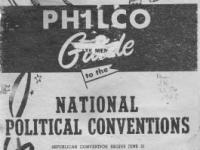Answer: The Progressive Party
In 1948, Philadelphia had the distinction of holding not one, not two, but three major political conventions, one each for the Republican Party, the Democratic Party, and the Progressive Party.
The 24th Republican National Convention, with almost 1100 delegates, met from June 21-25, 1948, at Convention Hall in West Philadelphia. The delegates nominated Governor Thomas Edmund Dewey of New York on the third ballot, and then nominated Governor Earl Warren of California as vice president. Their platform included promotion of civil rights, an anti-lynching law, elimination of the poll tax, armed forces integration, passage of the Equal Rights Amendment, support for the United Nations, and support of Israel.
Less than a month later nearly 1600 delegates met in the same hall from July 12-15 for the 30th Democratic National Convention. Harry Truman was nominated on the first ballot. Like the Republicans, the Democrats too supported civil rights, anti-lynching, abolition of the poll tax, the UN, and Israel. Unlike the conventioneers in June, however, these delegates reaffirmed New Deal domestic programs. Southerners, however, were upset about the strong civil rights language in the platform without a concurrent "states' rights" plank. A number of disgruntled Southern delegates walked out the proceedings and vowed to hold a convention in Birmingham, Alabama, to nominate a states' rights candidate; which they did, nominating Strom Thurmond.
Later that month, on July 23-25, the Progressive National Party also met at Convention Hall and rallied in Shibe Park. With over 3,000 delegates in attendance, Henry Wallace was nominated for president. Wallace had been vice president under Roosevelt and later served as secretary of commerce in the Truman administration. The Progressives stood for peace between the U.S. and the Soviet Union, ending the Truman Doctrine and the Marshall Plan, no military draft, and complete desegregation. (However, Wallace lost by a huge margin in the general election after being branded a Communist by his foes. He won only two percent of the popular vote. Many early Progressive supporters returned to the Democratic fold and helped Truman win the election.)
HSP’s library contains a number of publications that were produced for the delegates and visitors who descended upon Philadelphia during the summer of 1948. We also have small manuscript collection concerning the 1949 Republican Convention: Records of the Auxiliary Housing Division of the Philadelphia Mayor's Committee for the 1948 Republican Convention (#1822).

